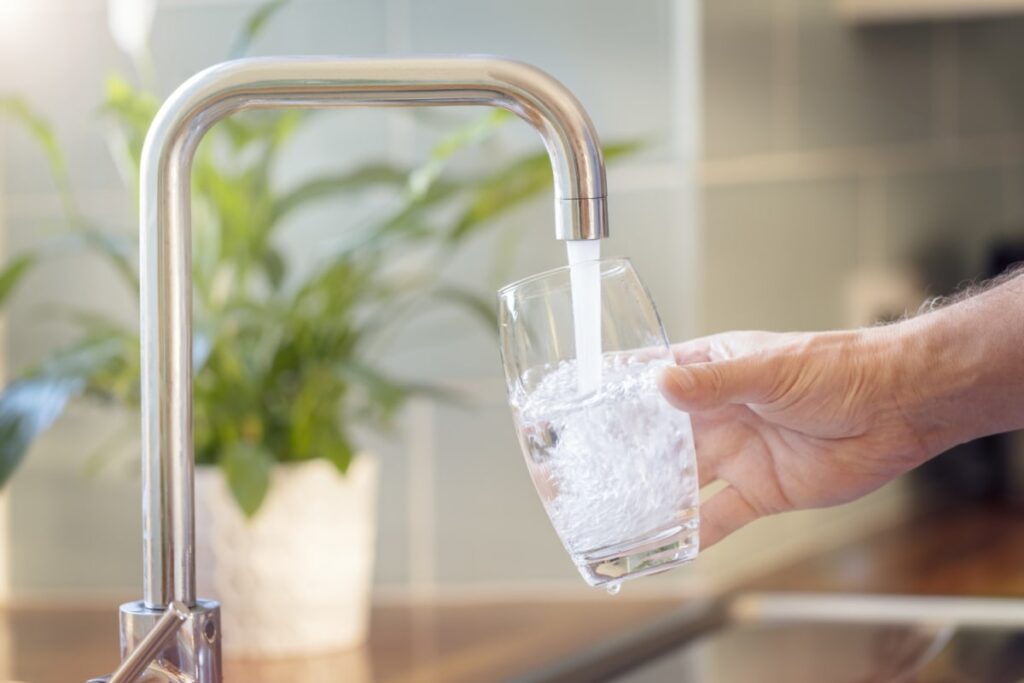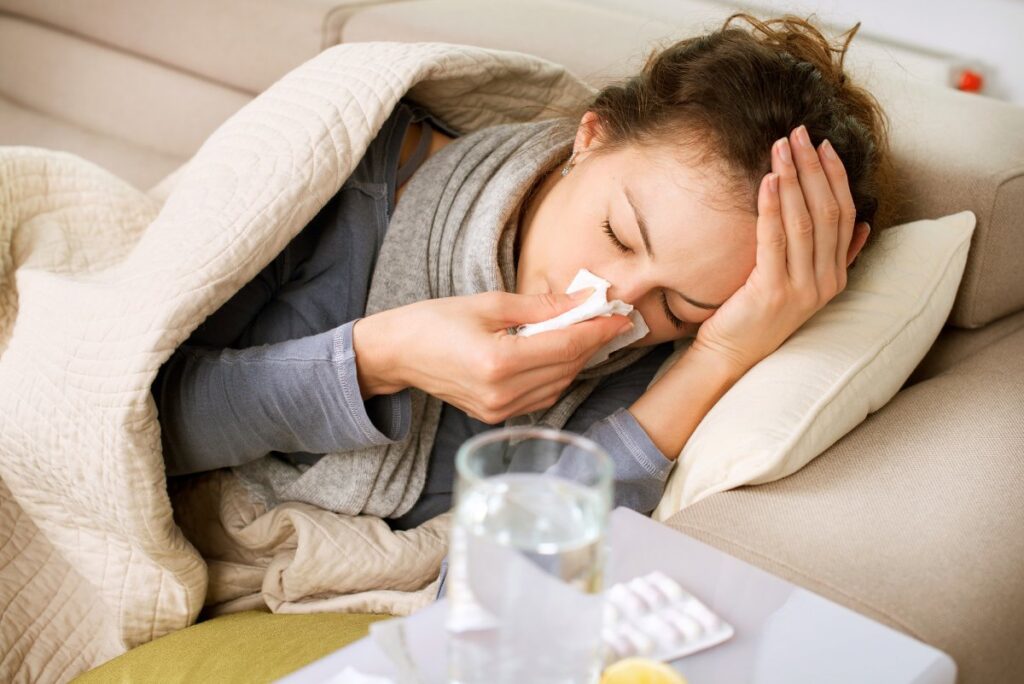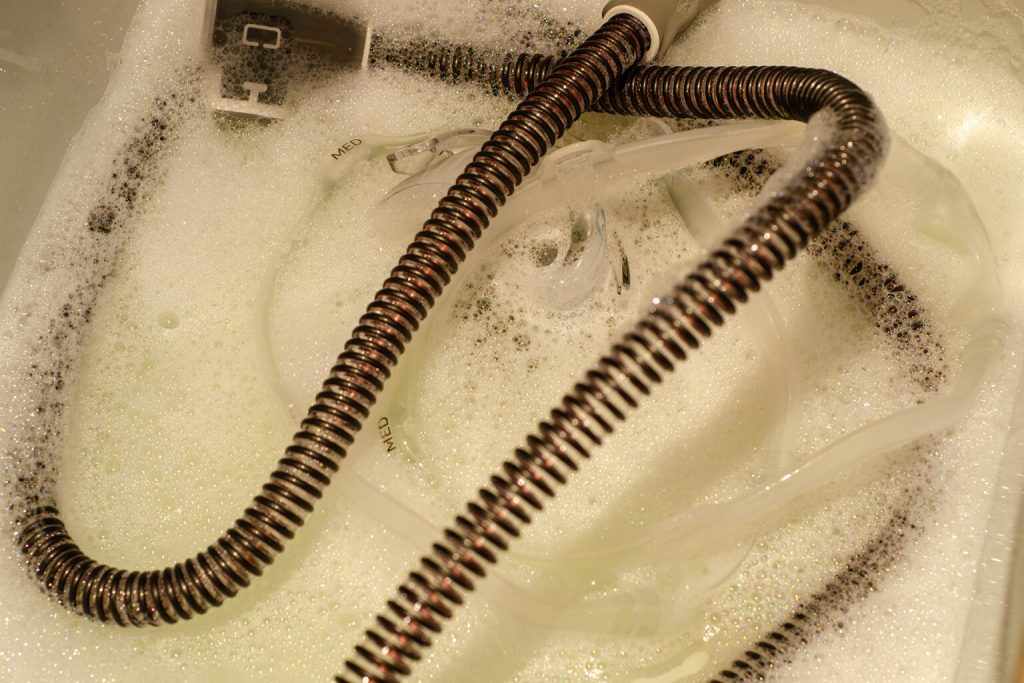When using the CPAP and humidifier, what type of water do the experts recommend? Well, when you ask around, you’ll meet with considerable confusion. Indeed, must you use distilled water? Can’t you use tap water for a change?
You definitely need to know what to do and what to avoid. That’s what we want to discuss. Whether you’re at home o traveling, you can learn about how to create a good supply of clean water for the CPAP
Exploring Some Suitable Water Types for Your CPAP Machine
Using Distilled Water for CPAP
The manufacturers strongly recommend using distilled water with the heated humidifier. Leading manufacturers like ResMed advise that doing this maximizes the water chamber’s life and prevents mineral buildup. In time, such a buildup can prevent the humidifier heating plate from warming the water and delivering enough moisture to soothe the nasal passage.
Distilled water is generally created during the distillation process. This happens when regular water turns into a gas and condenses back into a liquid; this removes virtually all microorganisms and inorganic compounds, including:
- Phosphorous
- Bacteria
- Calcium
- Magnesium
- Heavy metals
- Potassium
When the process completes, the only thing left behind is pure H20. For this reason, many find that distilled is excellent wherever a sterile environment is ideal- for instance, in a laboratory, medical clinic, or your CPAP itself!
If you deal with sleep apnea, try using mineral-free water (like distilled water). This will likely- extend your machine’s life and thus improve the quality of your therapy. You’ll get the much-needed deep sleep and wake up with less congestion.
Can i use tap water in my CPAP?
Many say it’s safe to use tap water with your CPAP. Well, this is not the best advice-either for you or your CPAP machine. Of course, tap water is widely considered an easy and inexpensive agent to use with your CPAP.
Regardless, tap water often contains unwanted contaminants and minerals. These can lead to problems in the tubing, the humidifier’s water chamber, and other parts. For instance, a 2018 Nature Study significantly revealed that 10% of the water wells in California’s Central Valley have dangerous arsenic levels.
While some may not care much about the issue of long-term exposure to the chemical components in tap water, you should be worried that you’re dealing with harmful deposits in your CPAP when using tap water.
Well, avoid using this type of water with your CPAP. When you do this, hard calcified deposits are usually left behind when the water evaporates from the device humidified chamber. This buildup can eventually feed fungal growth, affecting your CPAP tubing. This shortens your CPAP requirement’s replacement schedule.
You should recognize that not using distilled water may also void your CPAP manufacturer’s warranty.
Can you use tap water just for a single night? Well, doing this will not mean the end of the world. You can actually do so once in a while. But after you do this, make sure you clean your equipment’s humidifier chamber thoroughly the following day. Make sure you get rid of any mineral deposits.
Consider switching machines if you have no option but to use unfiltered tap water throughout your sleep therapy. Some heated humidifiers can even use tap water (an example is: the Philips Respironics DreamStation Go).
Also, note that the humidifier must always be properly cleaned after using tap water. This is undoubtedly a great idea- apart from cleaning with soap and water using a specialized CPAP cleaner. Follow this religiously!
Can i use filtered water in my CPAP
You can use the type of water filtered with a water filter. An example is the Brita water pitcher; you can safely use this with your CPAP and heated humidifier. While such a water filter may get rid of impurities, do not confuse this with purified water derived from deionization, distillation, or reverse osmosis.
You can also use Reverse Osmosis (RO) Water in your CPAP system. To do this safely, you merely need to maintain and change the filters in the RO system.
Can I use bottled water in my CPAP?
Is your bottled water labeled Spring Water or Mineral Water? It’s possibly laced with small amounts of minerals and salts. Never use this type of bottled water in your CPAP humidifier. You may, however, use other brands (like the Aquafina) if you cannot have distilled water. Brands like these usually have the water purified to get rid of impurities.
Generally, alkaline water may be described as the opposite of distilled water. Yes, it should never be used in your CPAP machine. This type of water is filtered to make it less acidic by increasing the pH level. It can contain compounds like bicarbonate and silica as well.
Smart Water Brand is one example of alkaline water. It contains electrolytes like calcium, magnesium, and potassium. While it’s okay to drink, it’s not suitable for CPAP therapy.
Can I use tap water in my CPAP machine for one night?
You may use distilled water in the humidified while traveling to places with less trustworthy water. Always ask yourself: Is the water unsafe to drink? If so, it’s also unsafe to use in your CPAP humidifier. Thus, using distilled water will reduce your exposure to potentially harmful substances.
Consider this: The use of tap water within Lousiana’s Neti pots has occasioned some reports of brain-related parasite infections. With this potentially fatal condition, the treatment can be ineffective. However, the use of the CPAP humidifier has not produced similar risks.
Where Can You Buy Distilled Water?
You can always get distilled water in many grocery stores. Ensure to read the labels carefully since distilled water generally differs from regular filtered or bottled water. If you’re traveling overseas, you can get distilled water in specialty stores. In some cases, you might find some in hardware stores.
What are the Advantages of Using a CPAP Humidifier?
Obviously, there are many benefits of using a CPAP humidifier. You’ll find that your CPAP machine is more comfortable if you use it with a humidifier; it’ll be more tolerable. For one, using a humidifier will generally reduce the problems of nasal congestion and mouth dryness. Regardless, this will be dictated by your personal preference and the local climate.
Considering these, you’ll determine how often you need to use this device. Indeed, depending on the manufacturer, you’ll be able to set the temperature level of the delivered humidity.
You’ll find that there’s a problem with using the standard tubing. The condensation in the tubes will cause what is referred to as a rainout. You’ll have more issues with this when your room is cool. You can, however, reduce this by using a heated tubing or climate line. This will deliver more humidity. There’ll be less dryness in the nose and sinuses. In turn, this will reduce the following risks:
- Nosebleeds
- Inflammation
- Nasal congestion
- Infections
It’s wise to turn up the humidity. This will make it necessary to refill the reservoir each night (or every few nights at the least). This is how you’ll keep it from drying.
Final Thoughts
Overall, here’s what you need to do and avoid:
Always use distilled water in the CPAP humidifier if you doubt your water supply’s quality or safety. This advice is particularly true if you are traveling to areas with unsafe water supplies.
Remember this: The use of tap water can cause the mineralization of your water tank. You may also face some risky exposures and potential health hazards. However, you may not be negatively affected if you use such water less frequently.
Ultimately, if you have no access to safe water sources, it may be advisable to use a CPAP without a humidifier; that would be the course of wisdom.




That didn’t answer our question which was: can we use softened wared if we can’t find distilled water?